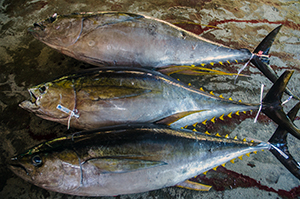
What fish trade policy options and recommendations can be put in place to help achieve the relevant Sustainable Development Goals (SDGs) of the United Nations? We need to understand the (i) relationship between fish trade and sustainable fisheries; (ii) potential promise of and the perils in the fish trade; and (iii) main trade-related concerns in the sustainability of fisheries. Sumaila (2017) addresses these issues in detail.
Trade in sustainable fisheries plays a crucial role in helping the global community achieve the SDGs because fish stocks support livelihoods and enhance the food security and income of millions of people while supporting vital ecological systems. However, overfishing, pollution, climate change, unsustainable trade and globalization, and illegal and unreported fishing are threatening the long-term sustainability of fisheries worldwide.
In every continent, fisheries are essential to the “blue economy.” Trade in fish and fish products is extensive and developing countries export a significant amount of these products to developed countries. Imported fish products dominate the markets of the European Union, Japan, the United States, and the People’s Republic of China, whose trade policies have a significant impact on the trade of fisheries and their sustainability.
Fish and fisheries products are among the most traded commodities in the world and there it has the potential to contribute to achieving the SDGs. However, this is possible only if the pros and cons are identified fully and the benefits are encouraged and enhanced while the costs are reduced to the barest minimum possible.
Trade-related measures can help to address the challenge of sustainable use of oceans and fisheries, but these measures will need to be part of a coherent policy framework that includes improvements to management and governance of fisheries resources at all levels to ensure that fishers and fishing communities are not left behind.
To help achieve the SDGs, trade in fish and fish products have to contribute to (i) conserving fishery resources; (ii) reducing poverty and inequality through distribution of benefits; and (iii) creating inclusive growth in the fisheries sector.
According to Fischer (2010), “trade liberalisation can be a boon to resource-rich countries, but not always; that trade can lead to the depletion of natural resources, but not always; and that trade bans can be appropriate, and certified trade can be helpful—but not always.” This quote clearly indicates that trade and its impacts on nature and people are complex and difficult to nail down.
The literature explores various ways in which trade policies can be designed to ensure that (i) trade favors fish-stock–rich countries, especially developing countries; (ii) trade does not lead to depleting fishery resources but rather supports their conservation and sustainable use; and (iii) trade in fish and fish products can help reduce poverty and hunger.
To achieve good governance or effective management of fisheries, these challenges need to be addressed: (i) tackle the common property or open access nature of fishery resources; (ii) mitigate and adapt to the effects of climate change, ocean warming, and acidification; (iii) discipline the provision of trade-distorting, capacity-enhancing, and inequity-generating government subsidies to the fishing sector; (iv) stop illegal, unreported, unregulated fishing; (v) address the self-defeating tendency to undervalue future benefits of fisheries; (vi) find a meaningful way for aquaculture to contribute to meeting our animal protein needs; (viii) enhance the position of women in the fisheries sector; (ix) reduce corruption in fisheries and fish trade; and (x) buy insurance by creating marine-protected areas.
To further increase the likelihood that these trade measures and policies will succeed in supporting the SDGs, certain prerequisites need to be in place (Sumaila 2016). First, fish trade policies need to be inclusive, transparent, and coherent, since the oceans are interconnected both in nature and through the markets. Second, capacity building is crucial: people make things happen and those who are well-trained and equipped are better at making things happen. A concerted global effort is required to train people in designing and implementing trade policies so that implementation of not only trade measures but also of other sustainable development policies is effective.
Current topical issues in fisheries science, policy making, and management, which have trade implications, are illegal, unreported, and unregulated fishing and capacity-enhancing subsidies. Sumaila (2017) presents trade policy options and measures to help tackle these issues as well as issues in international fisheries trade that relate to tariff and nontariff barriers.
Clearly, fish trade can support the SDGs by implementing certain trade-related measures together with more broad measures pertaining to the effective management of fisheries in general, and the equitable distribution of fish trade benefits among and between different groups in society.
The SDGs are crosscutting and so is fish trade because it deals with matters that intersect healthy oceans, sustainable fisheries, reduction of poverty and hunger, increase in gender and group equity, and the trade system. Thus, a comprehensive approach to trade is required and should take into account ecological, economic, legal, and local realities as well as existing multilevel governance regimes.
_____
References:
Fischer, C. 2010. Does Trade Help or Hinder the Conservation of Natural Resources? Review of Environmental Economics and Policy 4(1): 103–121.
Sumaila, U. R. 2016. Trade Policy Options for Sustainable Oceans and Fisheries. Geneva: International Centre for Trade and Sustainable Development and World Economic Forum.
Sumaila, U. R. 2017. Forthcoming. ADBI book chapter. Tokyo: ADBI.







Comments are closed.